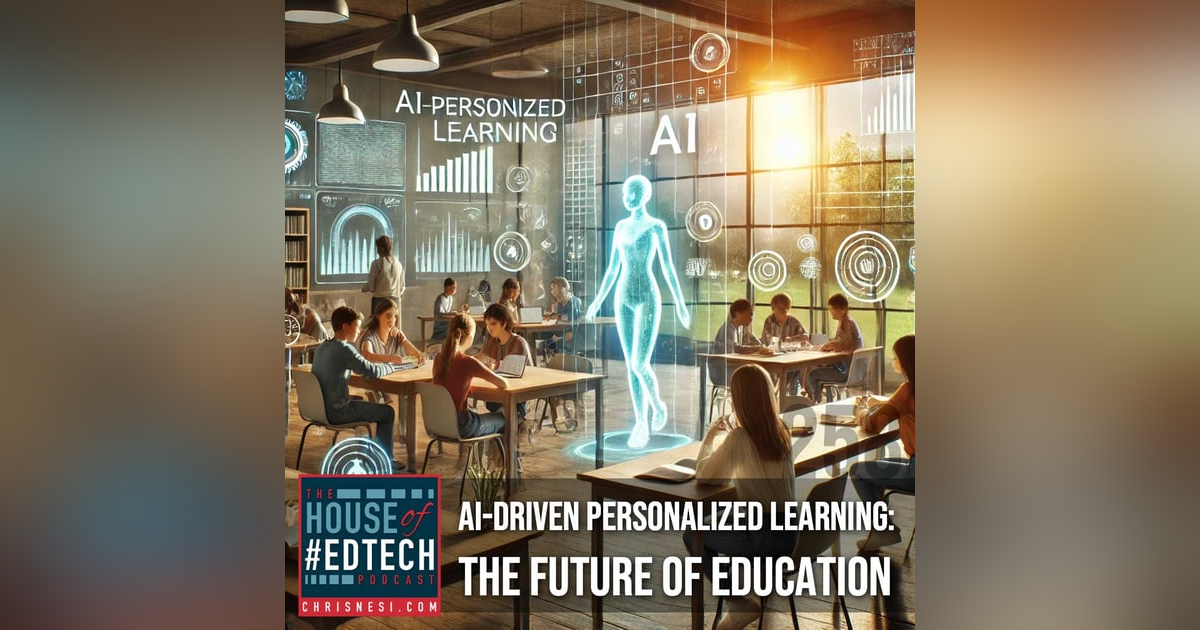AI-Driven Personalized Learning: The Future of Education - HoET258

Let's take a deep dive into the world of AI-driven personalized learning.
In this episode of House of #EdTech, we take a deep dive into the world of AI-driven personalized learning. From how AI adapts to individual student needs to address concerns about environmental impact and ethical use, we cover it all. This episode is perfect for educators, school administrators, and tech enthusiasts who want to understand the benefits, challenges, and best practices for incorporating AI into education.
Key Takeaways from the Episode:
- AI has incredible potential to personalize learning, making education more inclusive and engaging.
- Challenges like equity, ethics, and privacy must be addressed proactively.
- Educators play a crucial role in guiding students to use AI responsibly.
- Companies and institutions must consider environmental sustainability in AI adoption.
Understanding AI-Driven Personalized Learning
We kick off the episode by defining what AI-driven personalized learning is and how it’s transforming education. Key points include:
- AI’s ability to analyze data and tailor learning experiences for individual students.
- Examples of how AI can identify gaps in knowledge, recommend learning paths, and provide targeted feedback.
- The potential for AI to support students with diverse learning needs and styles.
- Why educators should view AI as a partner, not a replacement, in the classroom.
Overcoming Challenges and Barriers
This segment explores the practical and ethical challenges of implementing AI in education. Topics include:
- The digital divide and how to ensure equitable access to AI-powered tools.
- Concerns around data privacy, security, and student information.
- Addressing ethical concerns, such as avoiding biases in AI algorithms.
- Strategies for administrators to support educators in adopting and integrating AI tools effectively.
Real-World Applications and Success Stories
We highlight how schools and educators are successfully using AI to enhance learning experiences:
- Stories of educators leveraging AI for differentiated instruction and intervention.
- How AI is being used for formative assessments, real-time feedback, and curriculum planning.
- Tips for educators to experiment with AI tools in small, impactful ways.
- The importance of professional development to ensure educators are confident in using AI.
Addressing Listener Questions and Concerns
In this listener-driven segment, we address two thoughtful questions from our community:
- Stephanie:
- What is the environmental impact of using AI?
- We explore whether small AI-related tasks contribute significantly to carbon footprints and discuss how companies can offset their environmental impact.
- AJ Bianco:
- What’s appropriate for younger students when it comes to AI?
- Best practices for introducing AI tools to younger grades, including when and how to teach students to use them effectively.
- Emphasizing the importance of teaching students the how and why behind AI use, not just introducing tools.
- Download the Responsible Implementation Checklist
ASK QUESTIONS, SHARE YOUR FEEDBACK, AND CONNECT WITH ME
- Comment on the show notes below
- Click here to leave a voicemail
- Subscribe & Follow the House of #EdTech
- Email feedback@chrisnesi.com (audio files welcome)
THANK YOU TO MY AWESOME SUPPORTERS!
CLICK HERE TO BECOME AWESOME!
- Leo Calbusch - @leocalbusch
- Bryon Carpenter - bryoncarpenter.com
- Erin Cummings - @ErinC_CCIU
- Peggy George - Classroom 2.0 LIVE
- Jeff Herb - instructionaltechtalk.com
- Matt Miller - Ditch That Textbook
CHECK OUT MORE EDUCATION PODCAST NETWORK SHOWS
SUPPORT THESE BRANDS AND COMPANIES AND YOU WILL BE SUPPORTING THE PODCAST.
DISCLOSURE
This post may contain links to products or services with which I have an affiliate relationship. I may receive commissions or bonuses from your actions on such links.




















